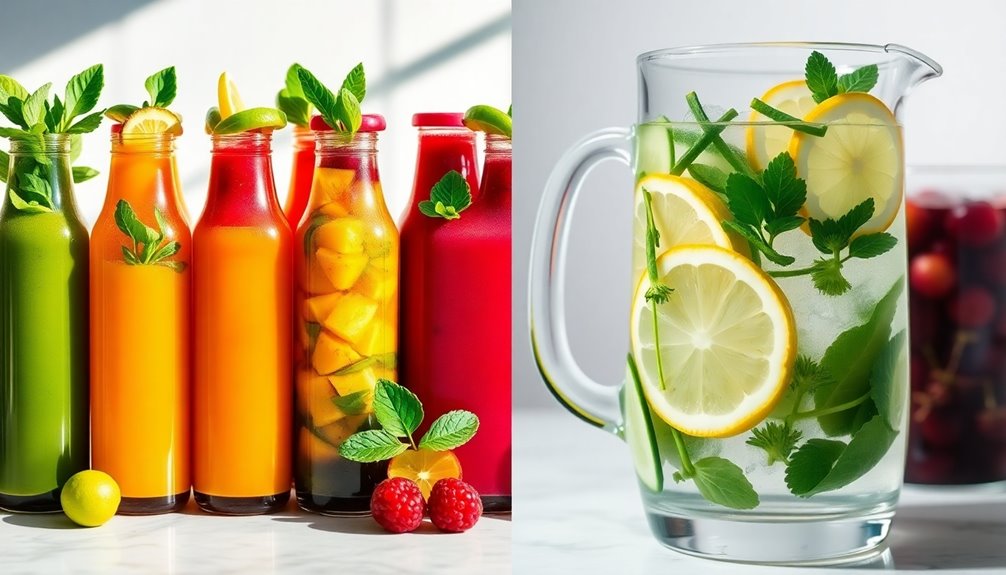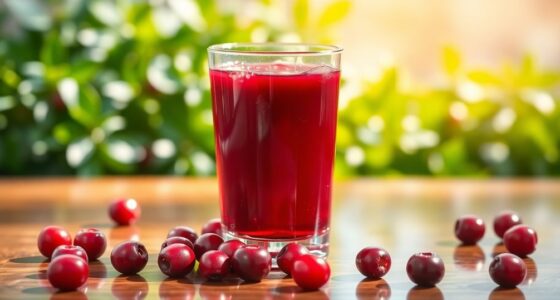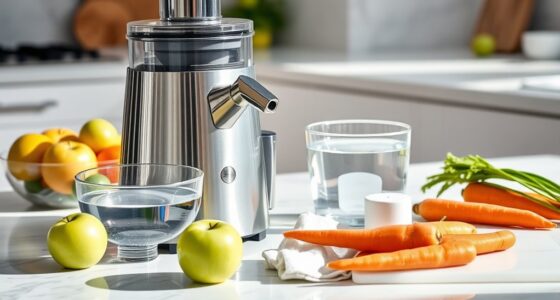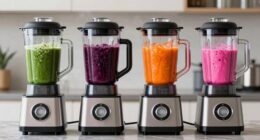When comparing juice cleanses and detox water, you'll find juice cleanses offer a quick nutrient boost and weight loss but come with risks like nutrient deficiencies and irritability. On the other hand, detox water provides hydration with minimal calories and essential vitamins while supporting overall health. It's a safer, more sustainable option. Want to uncover more insights about which choice is truly better for you? Keep going to explore the details!
Key Takeaways
- Juice cleanses provide concentrated nutrients but lack dietary fiber, risking nutrient deficiencies over time.
- Detox water offers hydration with minimal calories and nutrients, promoting digestion without drastic calorie cuts.
- Juice cleanses may cause rapid weight loss but can lead to tiredness and digestive issues from low caloric intake.
- While detox water is generally safe, it should not replace whole foods for sustained health benefits.
- Juice cleanses are often quick fixes, whereas detox water supports hydration and overall health in a balanced diet.
Understanding Juice Cleanses
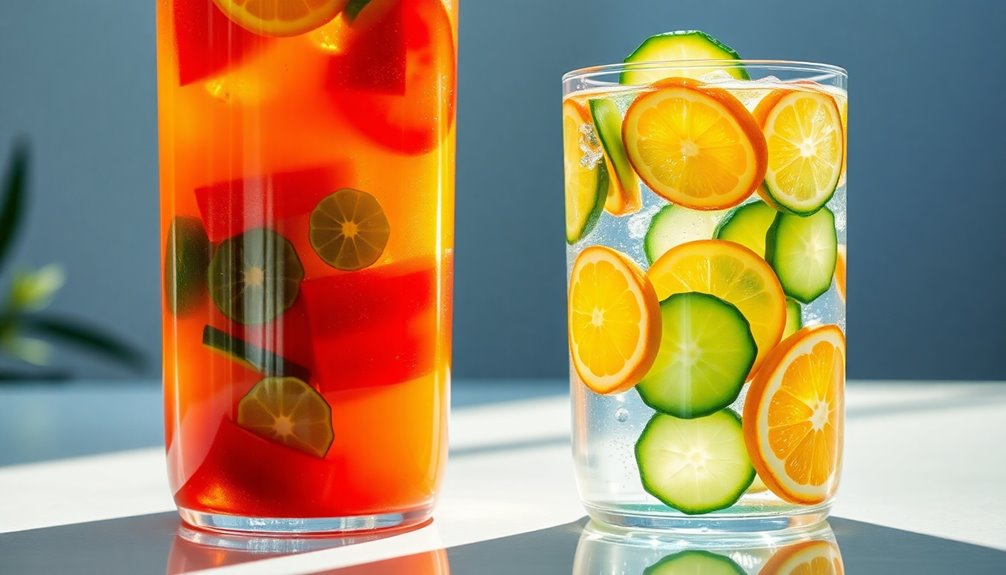
When you immerse yourself in juice cleanses, you'll find they promise a burst of nutrients from fruits and vegetables while being low in calories.
These detox regimens often claim to provide health benefits through a temporary influx of vitamin-rich, nutrient-dense foods. While you might experience quick weight loss due to calorie restriction, keep in mind that this isn't usually sustainable.
Juice cleanses can lack the fiber crucial for a healthy digestive system, which may lead to nutrient deficiencies over time. Additionally, many store-bought juices are high in added sugars, potentially counteracting the intended health benefits.
It's essential not to replace solid food entirely; instead, consider juice as a complement to a balanced diet for peak health and wellness. Moreover, including folate-rich foods in your diet can help prevent nutrient deficiencies that may arise from juice cleanses.
The Science Behind Detox Water

Juice cleanses offer a concentrated burst of nutrients, but they often come with drawbacks like high sugar content and low fiber.
Detox water, on the other hand, consists of water infused with whole fruits, herbs, or vegetables, providing essential hydration and vitamins without the excess sugar. This low-calorie alternative can help you reduce calorie intake while still enjoying delicious flavors.
Ingredients like lemon and cucumber may support digestion and promote a healthy gut microbiome, though scientific evidence on detoxification benefits remains limited. Additionally, air quality can impact overall health, making it essential to consider environmental factors alongside dietary choices.
It's important to remember that while detox water can complement your diet, it shouldn't replace balanced meals or serve as a detoxification solution, as your body naturally cleanses itself through its organs.
Comparing Nutritional Content

While both juice cleanses and detox water aim to promote health, their nutritional content varies considerably.
A juice cleanse typically packs around 300-600 calories per day from blended fruits and vegetables, offering a concentrated source of vitamins, phytonutrients, and antioxidants. However, it lacks dietary fiber, which is essential for digestion.
On the other hand, detox water is mostly water infused with fruits, herbs, or vegetables, providing negligible calories and minimal nutrients.
While it excels in promoting hydration, it doesn't deliver the same nutrient punch as juices. Beet juice, for example, is rich in nitrates and antioxidants that support overall health, making juice cleanses a more nutrient-dense option.
If you're looking for a nutrient boost, the juice cleanse is your best bet, while detox water serves as a lighter, revitalizing option without significant nutritional benefits.
Short-term Effects of Each Method
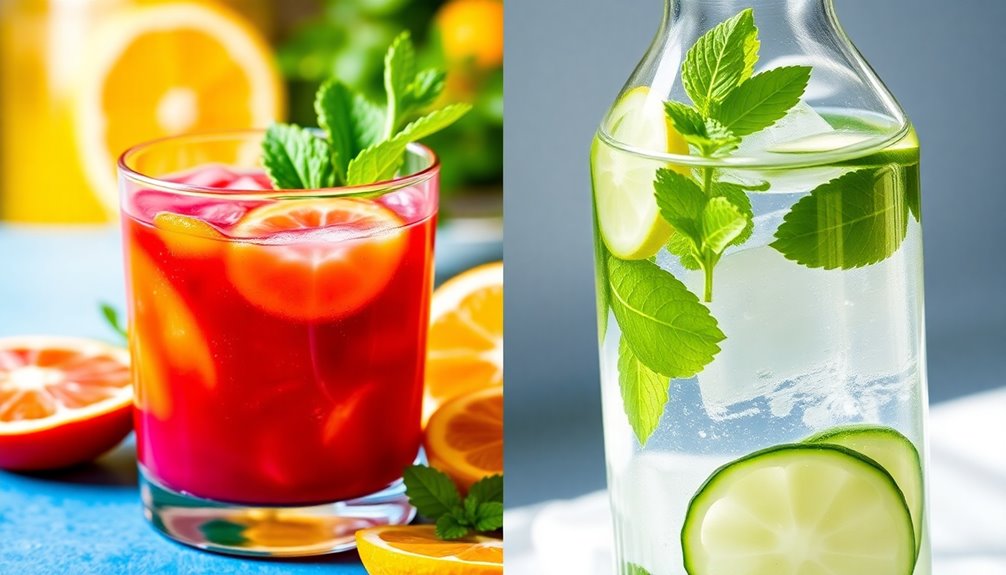
When you compare juice cleanses and detox water, you'll notice distinct short-term effects on nutrient density, weight loss, and digestive health.
Juice cleanses often pack a punch with vitamins but can lead to rapid weight loss and potential digestive issues.
In contrast, detox water keeps you hydrated and helps reduce bloating without the drastic calorie cuts. Additionally, incorporating chia seeds in weight loss can enhance the effectiveness of weight management strategies by promoting satiety and stabilizing blood sugar levels.
Nutrient Density Comparison
Although both juice cleanses and detox water aim to enhance your health, their nutrient density and short-term effects differ markedly.
Juice cleanses pack a concentrated source of vitamins, minerals, and phytonutrients, offering a quick nutrient boost. In contrast, detox water infuses fruits and herbs, providing a more diluted nutrient profile and primarily aiding hydration.
While juice cleanses may lead to short-term weight loss due to higher calorie reduction, detox water contributes fewer calories and doesn't notably impact weight loss efforts.
Additionally, the low fiber content in juice cleanses can hinder digestive health, and detox water lacks fiber altogether. Furthermore, incorporating high-fiber foods like chia seeds into your diet can enhance digestive health and promote regularity.
Ultimately, if you're after immediate nutrient intake, juice cleanses win, while detox water supports gradual wellness improvements.
Weight Loss Potential
If you're looking for a quick way to shed some pounds, understanding the weight loss potential of juice cleanses versus detox water is essential.
Here's a breakdown of short-term effects:
- Juice Cleanse: Rapid weight loss from calorie restriction, usually below 1,000 calories daily.
- Water Weight: Initial losses often stem from glycogen depletion and water weight.
- Detox Water: Promotes hydration and can reduce calorie intake from sugary drinks.
- Health Risks: Juice cleanses may lead to nutrient deficiencies and discomfort due to extreme calorie restriction.
Additionally, juice cleanses can provide a concentrated source of vitamins and antioxidants that may support overall wellness.
While juice cleanses can yield quick results, they often aren't sustainable.
Detox water offers a healthier approach, helping with weight loss without the adverse effects of a strict juice regimen.
Digestive Health Impact
Understanding the impact on digestive health can further clarify the differences between juice cleanses and detox water.
Juice cleanses can offer a quick nutrient boost from vitamins and phytonutrients, potentially improving gut health and bowel regularity in the short term. However, the low fiber content may lead to gastrointestinal distress and negatively affect blood sugar levels due to calorie restriction.
On the other hand, detox water, infused with fruits and herbs, retains more fiber, promoting hydration and supporting digestion through natural enzymes and antioxidants. Additionally, essential oils like peppermint may assist in soothing digestive discomfort when used in conjunction with these methods.
Both methods can temporarily relieve constipation, but detox water is generally gentler on the digestive system, making it a more sustainable choice for maintaining long-term digestive health.
Potential Risks and Drawbacks
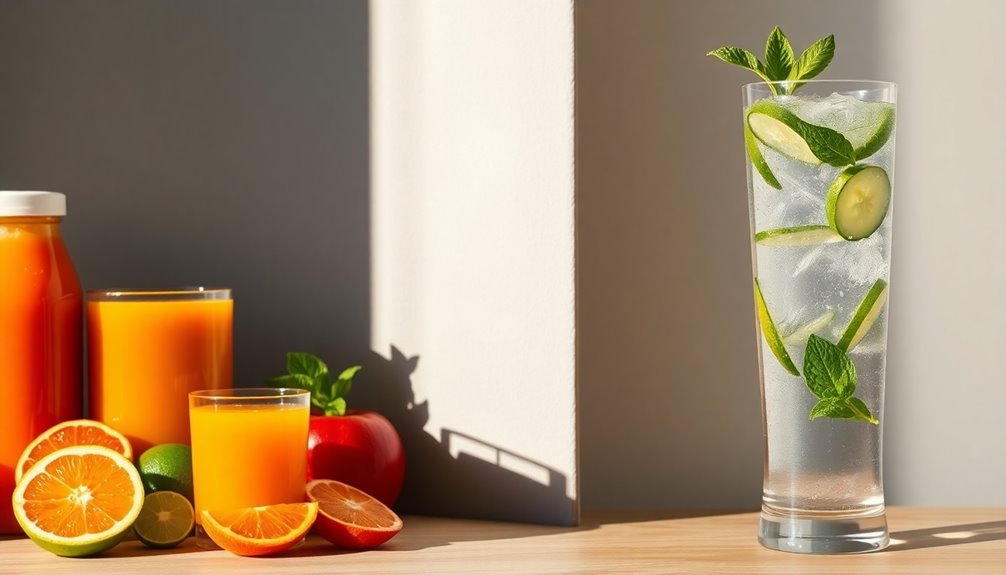
Juice cleanses come with several potential risks and drawbacks that you should consider before diving in. Here are some key issues:
- Insufficient caloric intake: Falling below 1,000 calories a day can lead to tiredness and irritability.
- Gastrointestinal distress: Low fiber content may disrupt digestive health and blood sugar management.
- Added sugars: Many store-bought juices are high in sugars, contributing to weight gain and diabetes risk.
- Disordered eating patterns: Extended juice cleanses can harm your relationship with food, fostering issues like orthorexia nervosa.
While detox diets might promise potential benefits, the health risks often outweigh them.
Be mindful of how these cleanses can impact your overall well-being, especially if you have food sensitivities or pre-existing health conditions.
Making the Healthier Choice
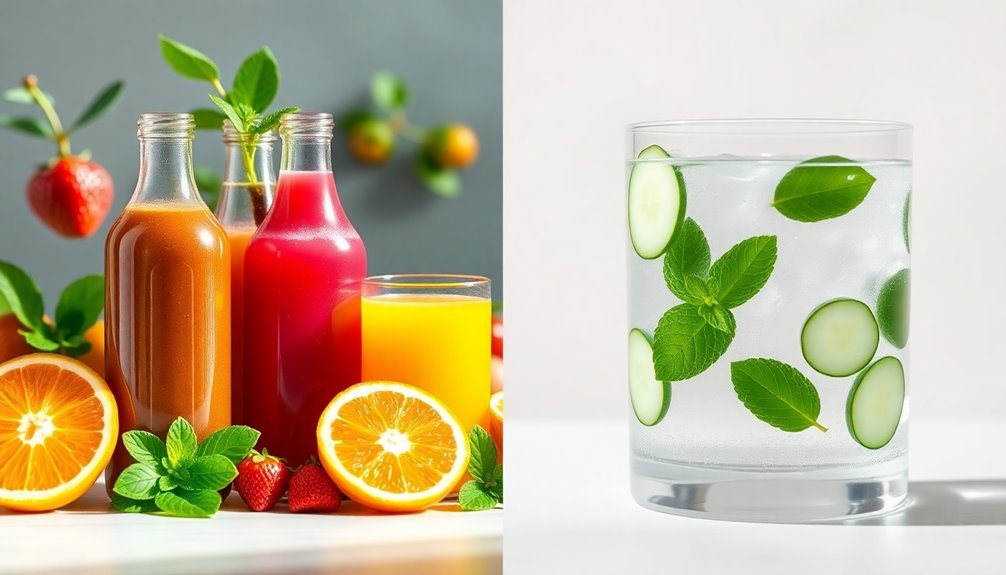
When you're choosing between a juice cleanse and detox water, consider the nutritional content each offers.
Juice cleanses can be high in sugars and low in fiber, while detox water provides hydration and essential vitamins without the added calories.
Making the right choice can greatly impact your long-term health and wellness.
Nutritional Content Comparison
- Vitamins: Juice cleanses are rich in vitamins A, C, and K, while detox water offers minimal vitamins.
- Calorie Restriction: Juice cleanses may lead to short-term weight loss due to calorie restriction, unlike detox water.
- Hydration: Detox water excels at hydration but lacks significant nutrients.
- Fiber & Antioxidants: Juice cleanses contain low fiber but high antioxidants, whereas detox water has no fiber at all.
Additionally, juice cleanses enhance digestion due to high fiber content from leafy greens, making them a more beneficial option for overall health.
If you're looking for a concentrated source of nutrients, juice cleanses are the healthier choice over detox water.
Long-term Health Impacts
Choosing between juice cleanses and detox water can greatly impact your long-term health. Juice cleanses might give you a quick weight loss boost, but they often lead to nutrient deficiencies and muscle loss due to calorie restriction.
In contrast, detox water, infused with fruits and vegetables, supports hydration and provides essential vitamins without excessive sugar. Regularly consuming detox water helps maintain hydration and promotes a balanced diet, while juice cleanses can disrupt your eating patterns and cause gastrointestinal distress.
For sustainable health benefits, it's vital to focus on whole foods rather than short-term fixes. Prioritizing balanced diets rich in fruits and vegetables will better support your long-term health and overall well-being. Additionally, understanding the role of nutrition in wellness can empower individuals to make informed dietary choices.
Frequently Asked Questions
What Is the Difference Between a Juice Cleanse and a Detox?
A juice cleanse and detox serve different purposes.
When you do a juice cleanse, you only drink fruit and vegetable juices for a set time, aiming to boost nutrients and flush out toxins.
On the other hand, detox usually involves lifestyle changes, like eating healthier or drinking infused water, without calorie restrictions.
While juice cleanses can lead to quick weight loss, detox methods focus on sustainable health benefits without extreme measures. These approaches prioritize nutrition and balanced eating habits, fostering long-term wellness rather than temporary results. Incorporating whole foods and hydration can support the body’s natural detoxification processes, enhancing overall vitality. Additionally, juice detox health benefits include improved digestion and increased energy levels, making them a more holistic choice for those looking to improve their health sustainably. Furthermore, individuals who embrace a more balanced lifestyle often report greater mental clarity and reduced cravings over time, which can contribute to better food choices. As more are drawn to these holistic practices, the juice detox benefits revealed in studies highlight their potential to improve not only physical health but also emotional well-being. By focusing on a well-rounded diet, people can experience lasting changes that support their goals for wellness and vitality.
What Is the Fastest Way to Flush Your Body of Toxins?
Think of your body as a well-tuned engine, naturally filtering out impurities. To flush toxins quickly, focus on hydration—drinking plenty of water is key.
Fresh fruits and vegetables can help too; they're like high-octane fuel for your system.
While juice cleanses and detox waters may seem appealing, they're not substitutes for a balanced diet. Instead, prioritize whole foods and regular hydration to support your body's natural detoxification process effectively.
Does Your Stomach Shrink on a Juice Cleanse?
No, your stomach doesn't physically shrink during a juice cleanse.
Instead, you might feel less full as your body adjusts to fewer solid foods. The temporary weight loss you experience comes from glycogen depletion and water loss, not a permanent change in stomach size.
Once you return to your normal eating habits, your stomach capacity will likely return to what it was before.
Maintaining a balanced diet afterward is key to avoiding weight regain.
Do You Actually Lose Weight on a Juice Cleanse?
Yes, you can lose weight on a juice cleanse, but it's often temporary.
The initial weight loss usually comes from calorie restriction and losing water weight. However, this method mightn't be sustainable, as you may regain the weight once you return to normal eating habits.
Additionally, juice cleanses often lack essential nutrients, making it hard to maintain long-term health.
Focusing on balanced meals and lifestyle changes is a better approach for weight management.
Conclusion
In the battle of juice cleanses versus detox water, it turns out both have their perks, but detox water might just take the crown. Did you know that a study found people who drink detox water regularly are 30% more likely to stay hydrated? This simple habit can boost your overall health without the sugar spikes from juice cleanses. So, if you want a revitalizing way to detox, grab that water infused with fruits and herbs instead!
Cindy thoroughly researches juicing trends, techniques, and recipes to provide readers with practical advice and inspiration. Her writing style is accessible, engaging, and designed to make complex concepts easy to understand. Cindy’s dedication to promoting the advantages of juicing shines through her work, empowering readers to make positive changes in their lives through the simple act of juicing.

